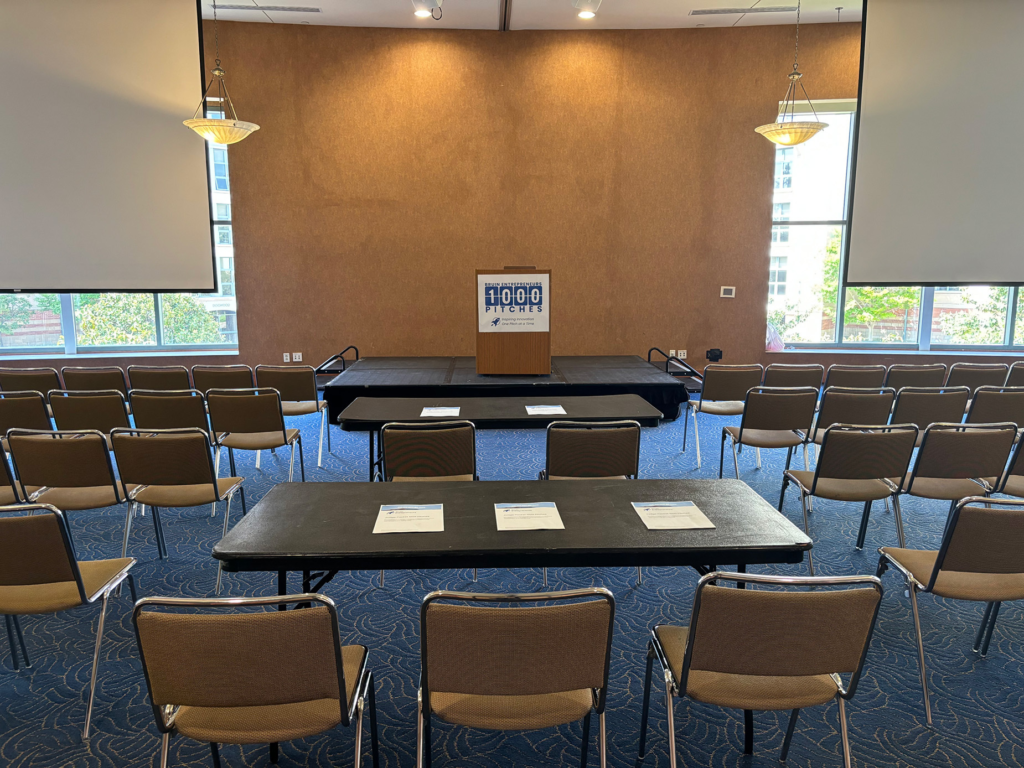The 1000 Pitches competition was held in the De Neve Plaza Rooms. The event, hosted by Bruin Entrepreneurs, allowed students to present their ideas to investors and fellow students. (Courtesy of Yashila Suresh)
Bruin Entrepreneurs gave students an opportunity to pitch their startup ideas at its 1000 Pitches event May 29.
Bruin Entrepreneurs hosted its annual event for students to present their ideas to investors and fellow students in the De Neve Plaza Rooms. The event was started to help students gain feedback on their business ideas and connect them with the startup world, said Saumya Mahajan, a rising third-year mathematics/economics student and director of 1000 Pitches.
“We also believe that hosting a pitch competition encourages students to think about these things – to think about a startup idea, to take that first step in their journey,” Mahajan said.
Ahead of the event, the club selected 10 finalists from a pool of 1,000 applicants, who presented their business pitches ranging from food delivery services to online platforms connecting UCLA students. The pitches were judged by five individuals, including two UCLA alumni.
Eytan Elbaz, a co-founder of software company Applied Semantics, said in an emailed statement that over the past 15 years, more than 150 Bruins have pitched their ideas to him – and he ended up funding three of them.
Lena Zhang, a co-founder of sourcing platform Cohere Commerce and a UCLA alumnus, said one of the main reasons she chose to judge the event was her desire to give back to the UCLA community. Zhang said she received important advice from mentors when she was a student at UCLA, and she had been looking forward to playing a similar role after gaining industry experience.
Mike Chen, Cohere Commerce’s other co-founder and a fellow judge for 1000 Pitches, said he also enjoyed having the opportunity to help young entrepreneurs workshop their business ideas.
“I love supporting young entrepreneurs, help them figure out these ideas,” he said. “It’s good to be encouraging, give back to the community.”
Many of the pitches students presented incorporated artificial intelligence, computer programming and scientific research into their products.
Elton Wang, who recently graduated with a master’s degree in business administration, pitched a startup focused on designing interactive cycling sunglasses with an integrated heads-up display. He said his pitch – named Era – served as an outlet for his interest in augmented reality.
Heart rate sensors, adaptive tints used in airplane windows and augmented reality are just a few of the tools that could bring Era to life, Wang added.
“We’ve reached a crucial inflection point where the technology is compact and power-efficient enough,” he said. “Now is the perfect time where the technology is finally ready for us to utilize.”
At the event, rising second-year business economics student Samantha Waugh and rising fourth-year applied mathematics and cognitive science student Adithi Balasubramanian pitched UCONNECT, an AI-based platform dedicated to provide students with personalized internship recommendations.
The platform uses a recommendation system where users answer a list of questions and receive AI-supplied internship suggestions that match their specific criteria, Balasubramanian said.
“The goal was to help our target market, which was undergraduate students, specifically first-year and second-year students, find internships because it can often be very hard and misleading,” Waugh said. “Our product is to help people find internships that are a good fit for them and help reorganize the process.”
Soulaimane Bentaleb, who recently graduated with a master’s degree in bioengineering, pitched Neuron – a software company that translates brain waves and quantifies human cognition in order to provide recommendations for businesses.
“(We’re) helping existing neuroscience researchers who have the skills to design a neuroscience study and to collect the data but don’t have the technical coding and engineering expertise … to pull helpful and valuable insights from this very complex brain wave activity,” Bentaleb said.
Neuron’s software uses electrical activity recorded by the brain in order to quantify cognitive processes such as cognitive fatigue, stress and focus, Bentaleb said. The company will focus on processing physiological data and turning it into suggestions for businesses to act on, he added.
Out of the many pitches, Neuron was named the winner of the 1000 Pitches competition.
Chen said Neuron was one of his favorites because it was within the biotechnology industry that he wasn’t very familiar with yet had the foundations to provide service and be successful.
Mahajan said working with students pitching startups and companies such as Era, Neuron and UCONNECT was a special experience.
“Our main mission is that you get to meet all these amazing founders and all these people, just kind of build a community around the startup ecosystem,” she said. “That’s something close to my heart and I’m really happy that I got to do it through directing this initiative.”
Many of the students who pitched their startups said they wanted to encourage their fellow students to pursue their ideas and push past initial doubts.
“Don’t be afraid,” Balasubramaniam said. “The beauty in starting something is the fear, but fear is part of the journey and it will help you get to where you need to be.”
Bruin Entrepreneurs hosts 1000 Pitches for students to pitch business ideas – Daily Bruin

